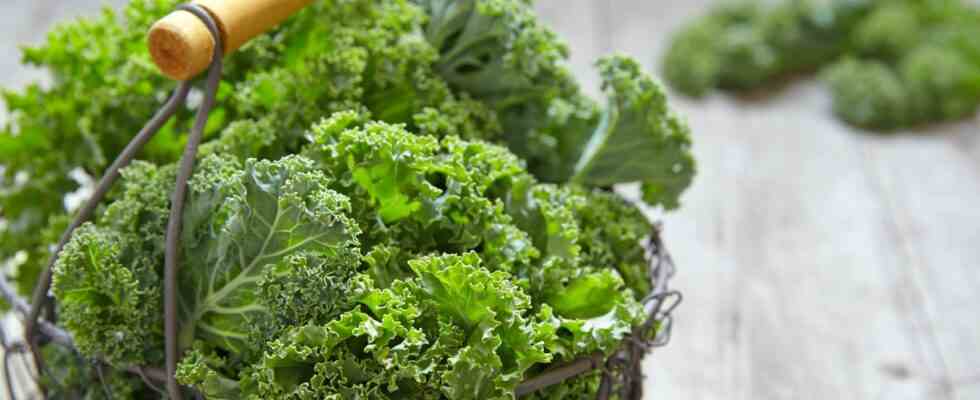Kale not only strengthens the cardiovascular system and the intestinal flora
the Kale Season has started and there are some health reasons in addition to the taste that speak for the local winter vegetables. Among other things, kale has a positive effect on cardiovascular systemthe intestinal flora and the immune system.
Kale contains numerous vitamins, minerals, fiber and phytochemicals such as flavonoids, carotenoids and sulforaphane. It is considered an extremely healthy addition to the diet. Yet Which Can health benefits be specifically expected?
Protection of the cardiovascular system
Various investigations such as a study by researchers from the Harvard School of Public Health show that the polyunsaturated fatty acids in kale (especially the Alpha Linolenic Acid) has been shown to reduce the risk of cardiovascular disease.
The included vitamin k also counteracts deposits in blood vessels, which in the long run hardening of the arteries and corresponding secondary diseases. And kale lowers that cholesterol levelswhich is also considered a risk factor for hardening of the arteries and cardiovascular diseases.
Green cabbage is therefore clearly recommended for a healthy cardiovascular system, especially since there are others positive effects on the blood vessels and the heart contained by the antioxidants are to be expected. And also, relieving inflammation helps prevent cardiovascular disease.
anti-inflammatory effect
the anti-inflammatory effect of kale is mainly attributed to the antioxidants it contains, but also to the polyunsaturated fatty acids. Kale has a very good antioxidant effect due to its carotenoid content. The positive influence of kale extracts on inflammatory processes is due to a study clearly proven.
In addition, there are possible indirect anti-inflammatory effects, such as the development of a healthy intestinal flora or the strengthening of the immune system.
The immune system and intestinal flora benefit
Our immune system benefits in particular from this high vitamin C content of kale, whereby one portion can already cover the daily requirement of vitamin C. Likewise, the contained antioxidants play like kaempfer oil and quercetin here a role.
In addition, the positive effect of kale on the immune system also seems to be related to its influence on the intestinal flora to be related as one study from last year showed.
The changes in the composition of the intestinal microbiome could be due to the high fiber content of kale, but could also be related to other components.
By strengthening the immune system and the intestinal flora, kale can help prevent infectious diseases such as colds, which in turn means that winter vegetables offer added value during the cold season.
effect against cancer?
Also an effect of kale against Cancer has been discussed in the professional world for some time. So has one study from 2012 showed that extracts from kale contribute to cell proliferation colon cancer inhibit.
A study from 2020 has this effect on human colon cancer cells in connection with the phytochemical composition of kale brought.
Furthermore has a study in mice for an effect against skin cancer pointed out and also with an inhibition of ovarian cancer was kale already in a study related
The extent to which kale can actually protect against cancer or inhibit its growth has not yet been finally clarified. But the indications of a protective effect are condensing and also over therapeutic uses of kale extract in the form of nanoparticles has already been used in a study thought.
Take advantage of kale season
In addition to the health benefits mentioned, there are also other positive effects such as an effect against diabetes and metabolic disorders obesity in the discussion and overall there is a lot to be said for using the kale season to enrich your diet in a healthy way. (fp)
Author and source information
This text corresponds to the requirements of medical specialist literature, medical guidelines and current studies and has been checked by medical professionals.
Sources:
- Dariush Mozaffarian, Renata Micha, Sarah Wallace: Effects on Coronary Heart Disease of Increasing Polyunsaturated Fat in Place of Saturated Fat: A Systematic Review and Meta-Analysis of Randomized Controlled Trials; in: PLoS Medicine (published 03/23/2010), journals.plos.org
- Sabine Kuntz, Clemens Kunz: Extracts from Brassica oleracea L. convar. acephala var. sabellica inhibit TNF-α stimulated neutrophil adhesion in vitro under flow conditions; in: Food & Function, Issue 6, 2014, pubs.rsc.org
- Md Shahinozzaman, Samnhita Raychaudhuri, Si Fan, Diana N Obanda: Kale Attenuates Inflammation and Modulates Gut Microbial Composition and Function in C57BL/6J Mice with Diet-Induced Obesity; in: Microorganisms (published 01/24/2021), mdpi.com
- Helle Olsen, Stine Grimmer, Kjersti Aaby, Shikha Saha, Grethe Iren A. Borge: Antiproliferative Effects of Fresh and Thermal Processed Green and Red Cultivars of Curly Kale (Brassica oleracea L. convar. acephala var. sabellica); in: Journal of Agricultural and Food Chemistry (published 06.07.2012), pubs.acs.org
- Beatriz de la Fuente, Gabriel López-García, Vicent Máñez, Amparo Alegría, Reyes Barberá, Antonio Cilla: Antiproliferative Effect of Bioaccessible Fractions of Four Brassicaceae Microgreens on Human Colon Cancer Cells Linked to Their Phytochemical Composition; in: Antioxidants (published April 28, 2020), mdpi.com
- Bilal Murad Qizilbash: Effect of curly kale Brassica oleracea var. sabellica on viability of cultured mouse melanoma cell; Dissertation (published December 201%), proquest.com
- Paulina Furdak, Natalia Pieńkowska, Grzegorz Bartosz, Izabela Sadowska-Bartosz: Extracts of Common Vegetables Inhibit the Growth of Ovary Cancer Cells; in: Foods (published 08/20/2022), mdpi.com
- Gitishree Das, Han-Seung Shin, Jayanta Kumar Patra: Multitherapeutic Efficacy of Curly Kale Extract Fabricated Biogenic Silver Nanoparticles; in: International Journal of Nanomedicine (published 03/15/2022), dovepress.com
Important NOTE:
This article contains general advice only and should not be used for self-diagnosis or treatment. He can not substitute a visit at the doctor.

